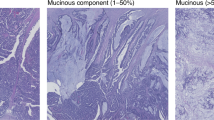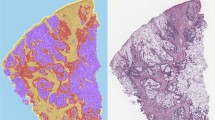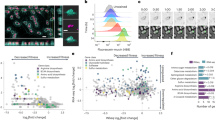Abstract
The lack of a suitable animal model that expresses human intestinal mucin genes limits the study of mucin function. The aim of this study was to examine whether human fetal intestinal xenografts, known to model host-restricted interactions with human-specific pathogens, express mucin genes in an appropriate developmental pattern when transplanted into severe-combined immunodeficient (scid) mice. Expression profiles for eight mucin genes were examined in human fetal ileal xenografts transplanted ectopically into scid mice for 10 wk. In situ hybridization was performed on fetal, xenograft, and adult intestinal tissue sections with 35S-labeled oligonucleotides specific to human tandem repeat sequences for MUC1, MUC2, MUC3, MUC4, MUC5AC, MUC5B, MUC6, and MUC7. Hybridization patterns observed with the MUC2, MUC3, MUC4, and MUC5AC probes demonstrated that mucin gene expression in xenografted fetal intestine was comparable to third trimester fetal and/or adult tissues. MUC2 and MUC5AC were expressed in a developmental-specific fashion. MUC5AC, expressed in first and early second trimester fetal bowel, was never detected in intestinal xenografts. MUC2 expression displayed a late fetal and/or adult-type hybridization pattern. MUC3 and MUC4 were not developmentally expressed. Appropriate developmental regulation of known intestinal mucin genes was recorded in ectopically grafted human fetal intestinal xenografts. Adult-like patterns of mucin gene expression in this model system will permit future studies aimed at characterizing cis/trans-acting factors that regulate mucin gene expression and function during development, disease, and wound healing and also in mucin-pathogen interactions during host defense.
Similar content being viewed by others
Log in or create a free account to read this content
Gain free access to this article, as well as selected content from this journal and more on nature.com
or
Abbreviations
- scid :
-
severe-combined immunodeficient
REFERENCES
Neutra MR, Forstner JF 1987 Gastrointestinal mucus: synthesis, secretion and function. In: Johnson LR (ed) Physiology of the Gastrointestinal Tract. New York, Raven, pp 975–1009.
Lichtman SN, Sherman P, Mack DR 1996 The role of mucus in gut protection. Curr Opin Gastroenterol 12: 584–590
Gendler SJ, Spicer AP 1995 Epithelial mucin genes. Annu Rev Physiol 57: 607–634
Lagow E, DeSouza MM, Carson DD 1999 Mammalian reproductive tract mucins. Hum Reprod Update 5: 280–292
Shekels LL, Hunninghake DA, Tisdale AS, Gipson IK, Kieliszewski M, Kozak CA, Ho SB 1998 Cloning and characterization of mouse intestinal MUC3 mucin: 3′ sequence contains epidermal-growth-factor-like domains. Biochem J 330: 1301–1308
van Klinken BJ, Einerhand AW, Duits LA, Makkink MK, Tytgat KM, Renes IB, Verburg M, Buller HA, Dekker J 1999 Gastrointestinal expression and partial cDNA cloning of murine Muc2. Am J Physiol 276: G115–G124
Hilkens J, Ligtenberg MJ, Vos HL, Litvinov SV 1992 Cell membrane-associated mucins and their adhesion-modulating property. Trends Biochem Sci 17: 359–363
Zhang K, Sikut R, Hansson GC 1997 A MUC1 mucin secreted from a colon carcinoma cell line inhibits target cell lysis by natural killer cells. Cell Immunol 176: 158–165
Komatsu M, Tatum L, Altman NH, Carothers Carraway CA, Carraway KL 2000 Potentiation of metastasis by cell surface sialomucin complex (rat MUC4), a multifunctional anti-adhesive glycoprotein. Int J Cancer 87: 480–486
Buisine MP, Janin A, Maunoury V, Audié JP, Delescaut MP, Copin MC, Colombel JF, Degand P, Aubert JP, Porchet N 1996 Aberrant expression of a human mucin gene (MUC5AC) in rectosigmoid villous adenoma. Gastroenterology 110: 84–91
Bartman AE, Sanderson SJ, Ewing SL, Niehans GA, Wiehr CL, Evans MK, Ho SB 1999 Aberrant expression of MUC5AC and MUC6 gastric mucin genes in colorectal polyps. Int J Cancer 80: 210–218
Chambers JA, Hollingsworth MA, Trezise AEO, Harris A 1997 Developmental expression of mucin genes MUC1 and MUC2. J Cell Sci 107: 413–424
Reid CJ, Harris A 1998 Developmental expression of mucin genes in the human gastrointestinal system. Gut 42: 220–226
Buisine MP, Devisme L, Savidge TC, Gespach C, Gosselin B, Porchet N, Aubert JP 1998 Mucin gene expression in human embryonic and fetal intestine. Gut 43: 519–524
Buisine MP, Devisme L, Copin MC, Durand-Réville M, Gosselin B, Aubert JP, Porchet N 1990 Developmental mucin gene expression in the human respiratory tract. Am J Respir Cell Mol Biol 20: 209–218
Buisine MP, Devisme L, Maunoury V, Deschodt E, Gosselin B, Copin MC, Aubert JP, Porchet N 2000 Developmental mucin gene expression in the gastroduodenal tract and accessory organs, I. Stomach: a relationship to gastric carcinoma. J Histochem Cytochem 48: 1657–1665
Bartman AE, Buisine MP, Aubert JP, Niehans GA, Toribara NW, Kim YS, Kelly EJ, Crabtree JE, Ho SB 1998 The MUC6 secretory mucin gene is expressed in a wide variety of epithelial tissues. J Pathol 186: 398–405
Friedberg JS, Ryan DP, Driscoll SG, Folkman J 1985 Human small bowel transplants into athymic mice and rats. Surg Forum 36: 375–378
Winter HS, Hendren RB, Fox CH, Russel GJ, Perez-Atayde A, Bhan AK, Folkman J 1991 Human intestine matures as nude mouse xenografts. Gastroenterology 100: 89–98
Savidge TC, Morey AL, Ferguson DJP, Fleming KA, Shmakov AN, Phillips AD 1995 Human intestinal development in a severe-combined immunodeficient xenograft model. Differentiation 58: 361–371
Savidge TC 2000 Ectopic transplantation techniques for evaluating gastrointestinal development. In: Sanderson IR, Walker WA (eds) Development of the gastrointestinal tract. B.C. Decker, Hamilton, Ontario, Canada, pp 307–318.
Department of Health and Social Security 1989 Review of the Guidance on the Research Use of Fetuses and Fetal Material (Polkinghorne Report). CM 762. Her Majesty's Stationary Office, London, pp 1–9.
Audié JP, Janin A, Porchet N, Copin MC, Gosselin B, Aubert JP 1993 Expression of human mucin genes in respiratory, digestive, and reproductive tracts ascertained by in situ hybridization. J Histochem Cytochem 41: 1479–1485
Savidge TC, Lowe DC, Walker WA 2001 Developmental regulation of intestinal epithelial hydrolase activity in human fetal jejunal xenografts maintained in severe-combined immunodeficient mice. Pediatr Res 50: 196–202
Dignass A, Lynch-Devaney K, Kindon H, Thim L, Podolsky DK 1994 Trefoil peptides promote epithelial migration through a transforming growth factor beta-independent pathway. J Clin Invest 94: 376–383
Chadee K, Petri WA, Innes DJ, Ravdin JI 1987 Rat and human colonic mucins bind to and inhibit adherence lectin of Entamoeba histolytica. J Clin Invest 80: 1245–1254
Drumm B, Roberton AM, Sherman PM 1988 Inhibition of attachment of Escherichia coli RDEC-1 to intestinal microvillus membranes by rabbit ileal mucus and mucin in vitro. Infect Immun 56: 2437–2442
Mantle M, Husar SD 1993 Adhesion of Yersinia enterocolitica to purified rabbit and human intestinal mucin. Infect Immun 61: 2340–2346
Yolken RH, Ojeh C, Khatri IA, Sajjan U, Forstner JF 1994 Intestinal mucins inhibit rotavirus replication in an oligosaccharide-dependent manner. J Infect Dis 169: 1002–1006
Mack DR, Blain-Nelson PL 1995 Disparate in vitro inhibition of adhesion of enteropathogenic Escherichia coli RDEC-1 by mucins isolated from various regions of the intestinal tract. Pediatr Res 37: 75–80
Rajkumar R, Devaraj H, Niranjali S 1998 Binding of Shigella to rat and human intestinal mucin. Mol Cell Biochem 178: 261–268
Mantle M, Basaraba L, Peacock SC, Gall DG 1989 Binding of Yersinia enterocolitica to rabbit intestinal brush border membranes, mucus, and mucin. Infect Immun 57: 3292–3299
Lowe DC, Savidge TC, Pickard D, Eckmann L, Kagnoff MF, Dougan G, Chatfield SN 1999 Characterisation of candidate live oral Salmonella typhi vaccine strains harbouring defined mutations in aroA, aroC and htrA. Infect Immun 67: 700–707
Savidge TC, Shmakov AN, Walker-Smith JA, Phillips AD 1997 Intestinal proliferation and infection in childhood. In: Halter F, Winton D, Wright NA (eds) The Gut as a Model in Cell and Molecular Biology. Kluwer Academic Publishers, London, pp 110–120.
Huang GTJ, Eckmann L, Savidge TC, Kagnoff MF 1996 Infection of human intestinal epithelial cells with invasive bacteria upregulates apical intercellular adhesion molecule-1 (ICAM-1) expression and neutrophil adhesion. J Clin Invest 98: 572–583
Eckmann L, Stenson WF, Savidge TC, Lowe DC, Barrett KE, Fierer J, Smith JR, Kagnoff MF 1997 Role of intestinal epithelial cells in the host secretory response to infection with invasive bacteria: bacterial entry induces epithelial prostaglandin H synthase-2 expression, and prostaglandin E2 and F2α production. J Clin Invest 100: 296–309
Seydel KD, Li E, Swanson PE, Stanley SL 1997 Human intestinal epithelial cells produce proinflammatory cytokines in response to infection in a SCID mouse-human intestinal xenograft model of amebiasis. Infect Immun 65: 1631–1639
Seydel KD, Li E, Zhang Z, Stanley SL 1998 Epithelial cell-initiated inflammation plays a crucial role in early tissue damage in amebic infection of human intestine. Gastroenterology 115: 1446–1453
Laurent F, Eckmann L, Savidge TC, Morgan GM, Theodos C, Naciri M, Kagnoff MF 1997 Cryptosporidium parvum infection of human intestinal epithelial cells induces the polarised secretion of C-X-C chemokines. Infect Immun 65: 5067–5073
Sedel KB, Zhang T, Champion GA, Fichtenbaum C, Swanson PE, Tzipori S, Griffiths JK, Stanley SL 1998 Cryptosporidium parvum infection of human intestinal xenografts in SCID mice induces production of human tumor necrosis factor alpha and interleukin-8. Infect Immun 66: 2379–2382
Lozniewski A, Muhale F, Hatier R, Marais A, Conroy MC, Edert D, le Faou A, Weber M, Duprez A 1999 Human embryonic gastric xenografts in nude mice: a new model of Helicobacter pylori infection. Infect Immun 67: 1798–1805
Mack DR, Michail S, Wei S, McDougall L, Hollingsworth MA 1999 Probiotics inhibit enteropathogenic E. coli adherence in vitro by inducing intestinal mucin gene expression. Am J Physiol 276: G941–G950
Author information
Authors and Affiliations
Corresponding author
Additional information
Supported in part by National Institutes of Health grants RO1-HD31852, PO1-DK33506, P30-DK40561, and R37-HD12437.
Rights and permissions
About this article
Cite this article
Buisine, MP., Aubert, JP., Walker, W. et al. Developmental Patterns of Mucin Gene Expression in Human Fetal Small Intestinal Xenografts Maintained in Severe-Combined Immunodeficient Mice. Pediatr Res 53, 898–904 (2003). https://doi.org/10.1203/01.PDR.0000064582.30004.62
Received:
Accepted:
Issue date:
DOI: https://doi.org/10.1203/01.PDR.0000064582.30004.62



